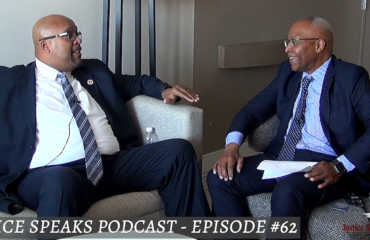(Click on the above arrow to listen to the audio.)
Professor David Wexler talks about Therapeutic Jurisprudence
In this episode, Justice Speaks turns to the field of Therapeutic Jurisprudence, where JSI CFO Judge Brian MacKenzie sits down with Professor David Wexler from the University of Puerto Rico School of Law.
Professor Wexler’s Personal Journey
Initially, Professor Wexler discusses his Brooklyn roots and relates his personal journey, describing how he became a lawyer working for the United States Justice Department before becoming a law professor at the University of Arizona School of Law.
Initially, Professor Wexler discusses his Brooklyn roots and relates his personal journey, describing how he became a lawyer working for the United States Justice Department before becoming a law professor at the University of Arizona School of Law.
We briefly discuss his work at the Justice Department including how he helped to draft the original Maranda[1] warnings. Then we talk about how he became a faculty member for the University of Arizona School of Law.
Professor Wexler then explains the twenty-year-long process involved in his becoming the only non-Puerto Rican faculty member for the University of Puerto Rico School of Law
Therapeutic Jurisprudence and the Law
Professor Wexler discusses his role in creating the concept of Therapeutic Jurisprudence which he nicknamed TJ. We explore how TJ is regarded as a potential therapeutic or anti-therapeutic agent. It looks at the law in action, seeing the law as consisting of rules, legal procedures, and individuals’ roles in the justice system. But TJ is always constrained by, and subordinate to, the concept of Due Process.
We then discuss how he developed the concept of TJ, starting with an article written by two psychologists who were assisting doctors in getting patients to follow medical advice. After reading the article he thought this concept could work in the legal system.
We talk about how TJ was first applied in Problem Solving Courts and moved on to how it can be mainstreamed in the courts. Professor Wexler describes the many ways TJ can be standardized.
We touch on the world-wide impact of TJ, including in such countries as Pakistan and Singapore. We go on to discuss how living in Puerto Rico caused him to learn Spanish, which resulted in an expansion of TJ into Spanish speaking countries.
Therapeutic Jurisprudence, Restorative Justice, and Procedural Fairness
We then discuss how TJ is different to Restorative Justice. Professor Wexler says originally Restorative Justice (RJ) was not considered part of the legal system, but slowly as it was mainstreamed, it became closer to TJ theories and the courts.
Professor Wexler then talks about Procedural Fairness and its relationship to TJ. He argues TJ incorporates Procedural Fairness while extending beyond it.
International Society for Therapeutic Jurisprudence
Professor Wexler has been named the honorary President of the International Society for Therapeutic Jurisprudence. The Society coordinates all TJ activity globally. It puts on an international conference every other year and it is the overarching organization for all things TJ.
Professor Wexler has been named the honorary President of the International Society for Therapeutic Jurisprudence. The Society coordinates all TJ activity globally. It puts on an international conference every other year and it is the overarching organization for all things TJ.
Finally, we discuss his relationship with Judges Peggy Hora and William Schma. He believes these judges are responsible for taking the academic theory of TJ and bringing it to the criminal justice system.
For more information on TJ:
You can email Professor Wexler’s at: davidbwexler@yahoo.com
[1] Miranda v. Arizona, 384 U.S. 436 (1966),
Get more articles like this
in your inbox
Subscribe to our mailing list and get the latest information and updates to your email inbox.
Thank you for subscribing.
Something went wrong.









